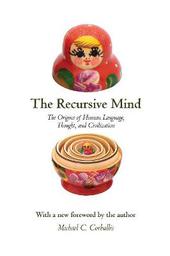
|
The Recursive Mind: The Origins of Human Language, Thought, and Civilization - Updated Edition
Paperback / softback
Main Details
| Title |
The Recursive Mind: The Origins of Human Language, Thought, and Civilization - Updated Edition
|
| Authors and Contributors |
By (author) Michael C. Corballis
|
|
Foreword by Michael C. Corballis
|
| Physical Properties |
| Format:Paperback / softback | | Pages:312 | | Dimensions(mm): Height 235,Width 152 |
|
| Category/Genre | Psycholinguistics
Philosophy of the mind |
|---|
| ISBN/Barcode |
9780691160948
|
| Classifications | Dewey:155.7 |
|---|
| Audience | | Undergraduate | | Postgraduate, Research & Scholarly | |
|---|
| Edition |
Revised edition
|
| Illustrations |
2 Maps
|
|
Publishing Details |
| Publisher |
Princeton University Press
|
| Imprint |
Princeton University Press
|
| Publication Date |
27 April 2014 |
| Publication Country |
United States
|
Description
The Recursive Mind challenges the commonly held notion that language is what makes us uniquely human. In this compelling book, Michael Corballis argues that what distinguishes us in the animal kingdom is our capacity for recursion: the ability to embed our thoughts within other thoughts. "I think, therefore I am," is an example of recursive thought, because the thinker has inserted himself into his thought. Recursion enables us to conceive of our own minds and the minds of others. It also gives us the power of mental "time travel"--the ability to insert past experiences, or imagined future ones, into present consciousness. Drawing on neuroscience, psychology, animal behavior, anthropology, and archaeology, Corballis demonstrates how these recursive structures led to the emergence of language and speech, which ultimately enabled us to share our thoughts, plan with others, and reshape our environment to better reflect our creative imaginations. He shows how the recursive mind was critical to survival in the harsh conditions of the Pleistocene epoch, and how it evolved to foster social cohesion. He traces how language itself adapted to recursive thinking, first through manual gestures, then later, with the emergence of Homo sapiens, vocally. Toolmaking and manufacture arose, and the application of recursive principles to these activities in turn led to the complexities of human civilization, the extinction of fellow large-brained hominins like the Neandertals, and our species' supremacy over the physical world.
Author Biography
Michael C. Corballis is professor emeritus of psychology at the University of Auckland in New Zealand. His books include From "Hand to Mouth: The Origins of Language" (Princeton).
Reviews"The Recursive Mind: The Origins of Human Language, Thought, and Civilization, is a fascinating and well-grounded exposition of the nature and power of recursion. In its ultra-reasonable way, this is quite a revolutionary book because it attacks key notions about language and thought. Most notably, it disputes the idea, argued especially by linguist Noam Chomsky, that thought is fundamentally linguistic--in other words, you need language before you can have thoughts."--Liz Else, New Scientist "Michael Corballis has written a delightful book that makes an important contribution to our understanding of the emergence of our unique capacity to communicate using a verbal generative language... Although I do not agree entirely with all of Corballis' positions, I do subscribe to most of them. More importantly I admire the way in which he formulates issues worth thinking about, which alone makes his contribution very valuable. I am happy to recommend this book to both lay readers and experts in the field."--Robert K. Logan, Journal of Multilingual and Multicultural Development "Engaging."--Australian "The book nicely represents current trends in evolution-based cognitive science and presupposes very little by way of background."--Mark Aronoff, Quarterly Review of Biology
|